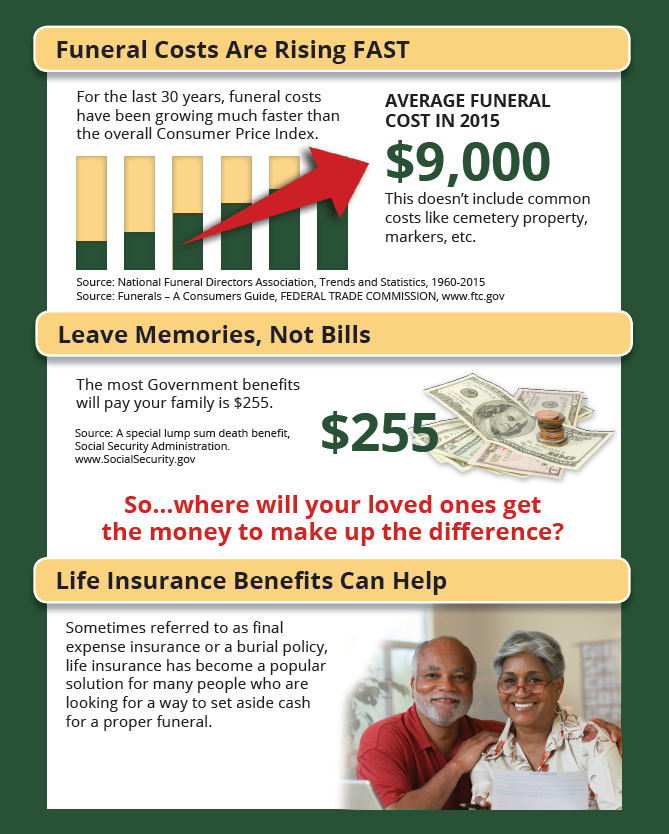What is Final Expense Life Insurance?
Final expense insurance is a whole life policy that pays medical bills and funeral expenses when you die. It’s also known as burial or funeral insurance. It’s a popular choice among seniors.
Most final expense plans have these features:
- Whole life insurance – no expiration if premiums are paid
- Cash value – insured may be able to take out a policy loan
- Fixed premiums as long as they’re paid
- Simplified issue – usually no medical exam (also called a life insurance exam) is required, just health questions on the application
- Easy application process
- Fast approvals – coverage can often be issued in days
- Affordable rates

Final Expense Life Insurance For Seniors
Final expense life insurance is popular with seniors because of its affordable price, smaller benefit amounts, and emphasis on covering funeral costs.
Traditional life insurance policies such as term insurance are primarily intended to replace any income lost when a loved one dies. These policies are most important to families during the earlier years when we’re working, paying a mortgage, making car payments, and raising our kids.
Once we’ve retired, paid off the mortgage, and the kids are out of the house, traditional life insurance policies aren’t needed as much. What we do need is a way to pay for any expenses we leave behind when we pass.
According to the National Funeral Directors Association, the median cost of a funeral can be over $9,000. With no way to pay for these expenses, surviving loved ones often experience a financial burden during a time of intense grief.
Many of us have experienced the death of a loved one and remember how stressful it was to juggle our grief, the funeral planning, and the financial obligations we had. The thought of our spouse or children going through the same experience is unbearable.
So how can final expense life insurance help? What can we do to protect our families from this financial burden? How can we make sure they aren’t left with a pile of bills when we pass?
Burial insurance for seniors is a smart and compassionate insurance solution for seniors looking to protect their loved ones from rising funeral costs. It’s typically easy to qualify because it’s issued based on answers to health questions. In many cases, you don’t need to take a medical exam.
Sample Rates for Seniors
Below are some sample monthly rates for seniors. As you can see, rates increase substantially the older you get. Most seniors get coverage as early as possible in order to lock in a lower rate.
$10,000 Policy with Funeral Planning
| Age | Female Monthly Rate | Male Monthly Rate |
|---|---|---|
| 50 | $25 - $40 | $30 - $48 |
| 55 | $28 - $46 | $35 - $55 |
| 60 | $33 - $52 | $43 - $67 |
| 65 | $41 - $64 | $56 - $75 |
| 70 | $53 - $82 | $74 - $93 |
| 75 | $72 - $108 | $100 - $131 |
| 80 | $93 - $152 | $126 - $190 |
* Rate estimates based on standard health and no tobacco use
** Funeral planning with Lincoln Heritage Funeral Advantage includes price shopping for common funeral items. Families save on average $1,800 on traditional funerals and $600 on cremations with Funeral Advantage.
What Questions Do Seniors Have About Final Expense Insurance?
Qualifying for a final expense policy is often easier than qualifying for other types of life insurance (such as term insurance). But there are still important questions to ask, such as:
- Does the policy expire?
- Do I have to take a medical exam?
- What features are included in the policy?
- How can the death benefit be used?
Does the policy expire?
Final expense policies don’t expire like term policies because they are a type of whole life insurance (learn how whole life insurance works). Your coverage won’t expire as long as you pay your premiums.
Do I have to take a medical exam?
In most cases, a medical exam isn’t required to qualify because the face amount is typically under $50,000. Coverage is usually issued based on the applicant’s answers to health questions on the application.
What features are included in the policy?
Depending on the life insurance company, your final expense policy may have added features such as child riders, accidental death and dismemberment, or support benefits for surviving loved ones such as funeral price shopping. Not all policies are the same, so make sure you review the policy’s benefits carefully.
How can the death benefit be used?
The hardest thing we must ever face is the death of a loved one. On top of this, surviving loved ones are often left to handle any end-of-life medical expenses and funeral costs. These expenses can add to the sense of grief and stress surviving friends and family members feel. Final expense life insurance was created to prevent this added pressure.
Even though final expense insurance focuses on covering funeral costs, the death benefit can be used for anything: medical bills, credit card debt, mortgage payments, etc. How the death benefit is spent is ultimately up to the beneficiary of the life insurance policy.
How Much Does Final Expense Insurance Cost?

Cost is often the #1 factor people focus on…but it’s not the most important factor! Instead of focusing on how much the policy is going to cost, look at how many expenses will be left behind and how much they’ll cost your family. Common expenses include medical bills, credit card debt, and funeral costs. We’ll cover each of these costs below.
Medical Bills
The current state of the healthcare industry has led to higher prescription costs, expensive medical procedures, and health insurance that doesn’t always cover consumer needs.
Of the 2.85 million people who died in the U.S. in 2019, more than eighty percent were on Medicare before they passed. A disproportionate share of Medicare spending occurs in the last year of life, covering costs related to chronic conditions, inpatient hospitalizations, and hospice care.
But government programs like Medicare and Medicaid only cover about two-thirds of healthcare spending by the elderly, according to the National Bureau of Economic Research. The report, which is based on data collected through the Medicare Current Beneficiary Survey between 1996 and 2010, found that healthcare spending for people aged 65 and over was approximately $18,424 per person, per year.
Medicare paid an average of $153 per day, per person, in 2016 to cover hospice care, in the following categories:
- Routine home care – $193 per day for services that patients need on a day-to-day basis.
- Continuous home care – $41 per hour for services during crises or at least eight hours a day to manage acute symptoms.
- Inpatient respite care – $173 per day to relieve unpaid caregivers on an occasional basis for no more than five days at a time.
- General inpatient care – $744 per day for care that cannot be provided in other settings.
Patients may still be responsible for co-payments, prescription drugs, emergency care, inpatient facilities, nursing care, and other end-of-life expenses. This leaves many people with a significant financial obligation that they can’t always afford. Final expense life insurance can help protect loved ones from the financial responsibility of any outstanding medical bills.
Debt
73% of American consumers die in debt according to research from Experian FileOne and Credit.com. The average total balance left is roughly $61,554 (including mortgages). Unfortunately, this debt doesn’t just disappear. In most cases, the estate pays off as many debts as possible before any assets are distributed to surviving family.
Here’s the average breakdown of consumer debt according to the research:
- Student Loans = $25,391
- Auto Loans = $17,111
- Personal Loans = $14,793
- Credit Card Debt = $4,531
Family members who count on the deceased’s assets to cover the final arrangements are often surprised to learn that there isn’t enough left over once all of the deceased’s bills have been paid.
Traditional life insurance is often used to leave your family enough money after you pass away and is often proportionate to the income your family would lose with your passing. Term insurance is the most common type of income replacement and can have face amounts in the millions of dollars.
Final expense life insurance is different. It’s uncommon for a final expense policy to be more than $20,000 because it focuses on paying for a very specific debt: funeral or cremation arrangements (learn more: how does cremation work? and Cremation vs. Burial - which is best for you?).
Families often expect their loved one’s estate will cover the cost of the funeral or that the funeral won’t cost much. But most families don’t realize the average funeral cost can be $9,000 or more. Final expense insurance can help reduce these costs and prevent families from emotionally overspending, especially when they know there’s a designated amount available.
Funeral Costs
In 2017, the median cost of an adult funeral with viewing and burial was $8,755 (including a vault). Funeral and cremation expenses can cost families thousands of dollars, often within days of their loved one passing. Casket prices alone can be $2,000 or more depending on the material and style used. Simply opening and closing the grave can cost families anywhere from $300 – $1,000 depending on the funeral home. Final expense insurance – often referred to as burial insurance or funeral insurance – is designed to cover these costs.

The rising costs of funerals have been well-documented over the years:
In 1960, the average cost of a funeral without a vault was just over $700
In 1985, that number had risen to $2,737.
In 2021, that number rose even more to $7,848, and with a vault, the cost was $9,420.
These numbers suggest an increase of 991 percent in funeral costs over four decades.
Add in the price of a grave marker ($200-$400 for a basic material), a published obituary, and other costs associated with a memorial service and the total can quickly approach $10,000 or more.
Here is the funeral cost checklist included in the median funeral expenses in 2021, according to the NFDA:
| Item | Cost |
|---|---|
| Funeral home’s basic service fee (nondeclinable) | $2,300 |
| Transporting remains to funeral home | $350 |
| Embalming | $775 |
| Preparing the body in other ways, such as makeup and hair styling | $275 |
| Facilities and staff to manage a viewing | $450 |
| Facilities and staff to manage a funeral ceremony | $515 |
| Hearse | $350 |
| Service Car | $150 |
| Basic memorial printed package | $183 |
| Metal casket | $2,500 |
| Median cost of funeral with viewing and burial | $7,848 |
| Vault | $1,572 |
| Cost with Vault | $9,420 |
Many cemeteries require a burial vault or concrete grave box to ensure the ground will not buckle over the casket. A vault is reinforced to preserve the remains from groundwater and insect activity. When calculating funeral costs, you may have to include the cost of a vault or grave box.
Get A Final Expense Insurance Quote Online
Insurance rates are constantly changing to account for new advancements in technology and healthcare. Every final expense company sets their own rates based on underwriting criteria and actuarial data. The most affordable policy with one company may not be the most affordable policy with another. The best way to figure out which policy is right for you is to speak with a licensed agent who can provide you with a free quote that meets your specific needs.
Lots of final expense plans exist, but which one is best for you? Which will protect your family the most? Which will pay your claim the fastest? Which will help your family with your funeral arrangements? These are important questions to consider before choosing a provider, especially when it comes to protecting your family during the funeral process.
For more than 50 years, Lincoln Heritage Life Insurance Company® has specialized in final expense life insurance. Our policies don’t require a medical exam – just health questions on a one-page application – making them easy to qualify for.
But what truly sets us apart from other final expense providers is that we help your surviving loved ones with the hundreds of details that arise during the funeral process. When one of our policyholders passes away, we want to make sure things go smoothly and easily for the loved ones taking care of the funeral arrangements.
We’ve partnered with the Funeral Consumer Guardian Society® (FCGS) – an independent senior consumer advocate organization – to bring you the Funeral Advantage program.
Funeral Advantage includes a life insurance cash benefit – up to $20,000 – and family support services through the FCGS. Your loved ones will receive a 24-hour toll-free number to call in their time of need.
As part of your Funeral Advantage policy, you’ll receive a two-page final wishes form to help you decide the style of funeral you want and document any additional requests.
Pros & Cons
- Focuses on after-life preparedness. Most life insurance policies aren’t designed to specifically address the many costs family members pay when preparing for a funeral. Caskets alone can cost up to $10,000 depending on the style and material. This doesn’t include other typical funeral costs like transportation, preparation of the body, grave liners, flowers, or the headstone. A final expense policy can help with these costs and protect your family from experiencing a financial burden.
- Final expense insurance is a type of whole life policy. For most traditional whole life policies, the death benefit and the insurance premium remain the same for the life of the policy. Most whole life policies last for the life of the policyholder and some accumulate cash value. Whole life insurance is often called “permanent life” because the term of the policy isn’t limited to a specific time frame like term insurance.
- It’s more affordable than many other insurance policies. Because it’s typically used to cover funeral costs, the coverage amount is usually much smaller than traditional policies. On average, people insure themselves for $10,000 – $20,000, making the premiums for a final expense policy more affordable than larger policies.
- Easy qualification. Because the coverage amount is lower than other types of life insurance, some final expense policies don’t require a medical exam to qualify. Most policies can be issued based on answers to health questions on the life insurance application.
One of the main drawbacks of final expense is its face amount is much lower than other types of life insurance like term insurance. And keep in mind the beneficiary can use the death benefit for anything – even if you took out the policy to help cover your funeral costs.
Do You Need Final Expense Insurance?
If you’re over 40 and need money to cover your final expenses and funeral costs, final expense life insurance is a perfect fit. Because the death benefit of the policy (typically $5,000-$20,000) tends to be less than the benefit of traditional insurance, the premiums tend to be more affordable for those on a fixed budget.
This makes it an attractive option for seniors looking to cover their end-of-life expenses. It’s a kind of permanent insurance – it doesn’t expire if premiums are paid – and it accumulates a cash value over time.
But this type of insurance isn’t just for seniors (learn more about affordable life insurance over 50, life insurance for seniors over 60, life insurance for seniors over 70, and life insurance for seniors over 80). Anyone concerned about leaving their loved ones unprepared when they pass should consider taking out a life insurance policy on themselves. Children can also buy life insurance for parents. Getting multiple quotes – including a final expense quote – can help you determine what type of life insurance is best for you.
If you’re independently wealthy or have enough set aside in savings, you may not need final expense insurance. Just keep an eye on rising funeral costs and always make sure you stay up-to-date on current costs.
If you’re over the age of 85, in hospice care, or currently hospitalized you may not be able to qualify. Certain health conditions such as terminal illness or AIDS may also prevent you from qualifying.
Who’s It Best For?
This type of life insurance is best for seniors because of its focus on covering funeral costs and other end-of-life expenses. You may have seen this type of coverage offered as burial insurance for seniors or funeral insurance, but these are the same as final expense insurance.
Final expense is best for seniors because it’s affordable, usually offers a no-medical exam qualification, and can help with planning certain aspects of their final arrangements (choosing a funeral home, flowers, music, etc.).
How Do You Apply?
Every life insurance policy requires you to fill out an application. Depending on the life insurance company, the application can be 1-2 pages long or can be 5-10 pages long. The longer application will ask dozens of questions, such as the applicant’s height and weight, blood type, family history, and level of activity. These companies typically require a medical exam with blood and urine analysis.
Other companies – like Lincoln Heritage – have a 1-page application and no medical exam is required. Coverage is based on the applicant’s answers to health questions, not medical tests.
When applying for coverage, you can often call or fill out a form online to receive a free no obligation quote. Your quote will be provided to you directly from the insurer or from one of its licensed representatives. Coverage can be sold over the phone in some cases, but most policies will require some kind of face-to-face interaction.
Pre-Qualifying Questions
Some example questions you may have to answer on the application cover the last two years of your health and include:
- Have you tested positive for HIV or AIDS?
- Are you currently bedridden, hospitalized, in a care facility, or receiving hospice care?
- Do you have disease of the heart, including heart attack or heart surgery?
- Do you have congestive heart failure?
- Do you have disease of the circulatory system, including stroke?
- Do you have cancer?
- Have you had alcohol or drug abuse?
- Do you have Alzheimer’s disease or dementia?
- Are you taking medication or been treated by a physician for any of the conditions above in the last 2 years?
Even if you answer “yes” to one or more of these questions, you may still qualify for coverage. With final expense life insurance, most people can get coverage even if they’ve had health issues.
Benefit Levels

Most policy amounts are under $50,000, but the average policy is taken out for $10,000 – $20,000. The exact benefit amount will vary depending on your health and what you’re looking to protect. If you qualify for a modified plan, your coverage amount may be less than a traditional final expense policy.
Modified plans are issued to applicants with higher health risks and usually have a 2-3 year waiting period. They are typically issued to applicants with one or more health conditions or if the applicant is taking certain prescriptions. If the insured passes during this period, the beneficiary will usually receive all of the premiums paid into the policy plus a small additional percentage.
Another final expense option offered by some life insurance companies are 10-year or 20-year plans that give applicants the option of paying their policy in full within a certain time frame. These plans have higher premiums and are usually considered standard final expense plans.
End-Of-Life Insurance Tips
Be honest
The most important thing you can do is answer questions honestly when getting end-of-life insurance. Anything you withhold or hide can cause your benefit to be denied when your family needs it most.
Some people think that because most final expense policies don’t require a medical exam they can lie about their health and the insurance company will never know. But companies often order years’ worth of medical records when their insured dies during the policy’s contestability period. If there are any discrepancies between the answers on the application and the medical records, the claim is often denied.
Plan ahead
Take the time to understand funeral costs in your area. You can request a general price list from any funeral home in your neighborhood to get an idea of how much your final arrangements could cost your loved ones.
If they don’t already, make sure the person who will be in charge of your affairs has copies of all important documents. Share your final wishes with them too (what flowers you might want, what passages you want read, songs you want played, etc.). Documenting these ahead of time will save your loved ones a lot of stress and will prevent them from trying to guess what you wanted.
Review your coverage often
Funeral costs are rising all the time and your health could change suddenly as you get older. Life insurance is not a one-time purchase. It’s important to review your coverage often to ensure you have enough to protect surviving family members.
Beneficiaries
There are three main types of life insurance beneficiaries: primary, contingent (or secondary), and tertiary. The primary beneficiary gets 100% of the death benefit when the insured dies. If the primary beneficiary passes before the insured, the contingent receives the benefit. Tertiary beneficiaries are often a last resort and are only used when the primary and contingent beneficiaries pass before the insured.
Your death benefit can be split among multiple primary and contingent beneficiaries. Make sure you designate the percentages each should receive and verify the information once your policy is issued. You should also notify your beneficiaries of any percentages you’ve put in place to ensure there is no confusion when the time comes.
Whenever possible, choose an adult as your primary beneficiary as this will simplify the distribution of the death benefit. Provide as much relevant information as you can about your beneficiaries (their address, phone number, date of birth, etc.) so the insurance company can locate them quickly when a claim is submitted.
It’s important to periodically review your beneficiary information to make sure it’s up-to-date. Always notify your life insurance company of any change of address or phone number so they can update their records.
Pre-Paying
Many states allow you to pre-pay for your funeral. Before you pre-pay, check to see how the money will be held. Depending on the funeral, you may be able to lock in a certain rate for the services the funeral home will perform when the time comes.
As with any final arrangement, keep detailed documentation for yourself and for the person who will be in charge of your affairs.
Pre-paid funeral plans may seem like a smart choice, but make sure you understand exactly how they work. In most cases, pre-paying for your funeral is less flexible than getting final expense insurance because your prepaid plan can only be used to cover funeral expenses. If you move or change your final wishes (example: you decide you want to be cremated and have your ashes scattered), you and your family may lose the money you’ve paid to the funeral home.
FAQs
What does final expense insurance cover?
Your beneficiary can use the death benefit for anything, but it’s typically used to cover funeral or cremation expenses.
What is the difference between final expense and life insurance?
Final expense is a type of whole life insurance and usually has a smaller face amount than traditional insurance. It focuses on covering end-of-life expenses while most life insurance policies focus on income replacement.
How does final expense insurance work?
It works like most other types of life insurance: there’s an application process and a review/approval process by the insurer. The death benefit is paid to the primary beneficiary once the claim is approved.
What is the maximum age to get final expense insurance?
It depends on the insurance company. Most people can get coverage until they turn 85. There are some companies that insure someone over the age of 85, but be prepared to pay a very high premium.
What happens to the excess proceeds of final expense insurance?
Final expense insurance doesn’t guarantee a certain amount of money towards funeral costs – 100% of the death benefit goes to the primary beneficiary. If you do any kind of funeral planning in advance, you can document your final wishes for your primary beneficiary and show how much of the policy benefit you want to go towards final arrangements.
How do you buy funeral insurance or final expense insurance for children?
The process is typically the same at every age. Most insurance companies require an individual be at least 30 days of age to apply for life insurance.
How quickly are final expense insurance policies paid out?
This depends solely on the life insurance company. Some companies can take weeks or months to pay the policy benefit. Others, like Lincoln Heritage, pay approved claims in 24 hours.
What are the average premiums for final expense insurance plans?
It’s difficult to say what the average premium will be. Your insurance rate depends on your health, age, sex, and how much coverage you’re taking out. A good estimate is anywhere from $40-$60 a month for a $5,000 – $10,000 policy.
How much is final expense insurance for a smoker?
Rates for smokers are usually 30% higher than a non-tobacco rate. Tobacco rates are higher no matter what type of life insurance you take out. The older you are, the higher your tobacco rate will be.
Final expense insurance lifts a financial burden from families grieving the loss of someone they love. If you want to provide those you care about a safety net during their time of grief, this policy type is a great option.



